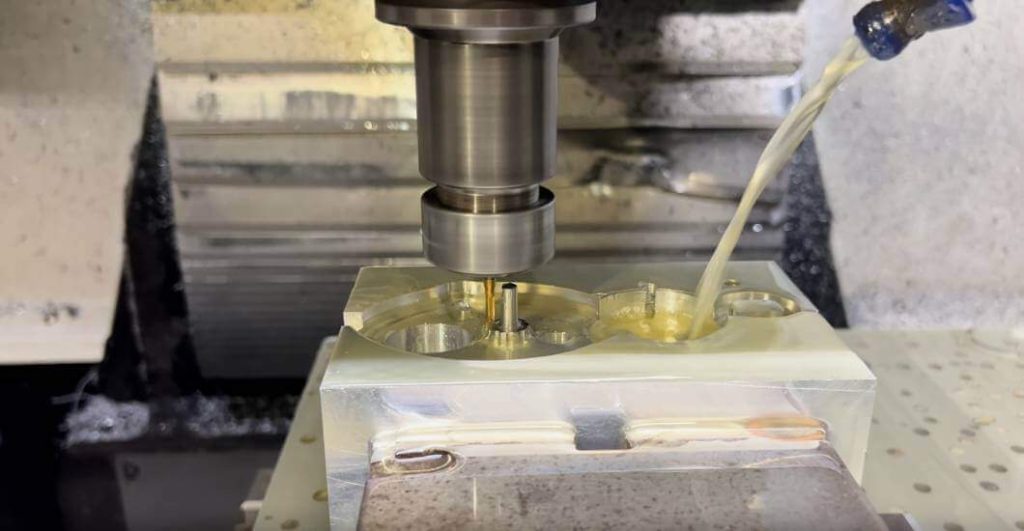Ready to take your business to the next level? Read on to discover everything you need to know about CNC precision machining!

CNC machining is a very specific machining process that uses computer-controlled machine tools to produce parts. Traditionally, this process is carried out by skilled machinists, but some companies are using robots to produce parts at high speed.
Ultimately, precision machining boils down to two key aspects. First, you’ll need the right cutting tools (the more advanced, the better) to remove material as needed; this allows you to perfectly match the part dimensions your project requires. Next, you’ll need a CNC (Computer Numerical Control) machine to control the cutting tool as it works.
Precision machining always involves five steps, no matter how big or small the project.
The first step is to use CAD (Computer Aided Design) software to design the part you want to make. The second step is the conversion of the CAD design into CAM so that the CNC machine will be able to understand the design.
This includes machine calibration, part mounting, clamping tightness and proper cooling. The fourth step is to run the process and let the CNC machine do the work.
The fifth and final step is to check the finished part to see if it is good “as is” or if it needs further processing (e.g. polishing or grinding). The good news is that with the right tools (like those from DATRON), you’ll rarely need to finish the part.
There are many different types of CNC machining equipment, so you can find the perfect tools for your needs. These include millers, which use specialised cutters to remove excess material from the part you are machining. Remember that there are many different types of milling cutter, including chamfer mills, end mills and helical mills.
You’ll also need to use CNC turning equipment. This equipment rotates the part you are working on alongside a rotating cutting tool. You will probably be familiar with some of the more common turning equipment, such as lathes, threads and external grooves.
Finally, you’ll need CNC drilling equipment to facilitate your precision machining needs. This equipment uses rotating, multi-point drills to create cylindrical holes in the various workpieces you work on.

The ability to work with many specialised tools is one reason why CNC precision machining is so fulfilling. These include spot drills, which are used to make small starting points. You then use a twist drill to work on these points. Another important tool is the end mill, which allows you to remove excess material quickly and neatly.
Reamers are precision tools that help you create flat sections of material before you cut. Speaking of precision tools, reamers allow you to enlarge existing holes while maintaining your project’s tight tolerances.
Other specialist tools are available depending on your requirements. These include hollow cutters, gear cutters, fly cutters and thread mills. When in doubt, we recommend that you contact us for advice on which tool is best for which job.
While CNC machining has a number of potential applications, it is used primarily in three industries. This includes the automotive industry, the medical industry, and the aerospace industry.
On the face of it, these are very different industries, so why do they all rely so heavily on precision CNC machining? In a nutshell, each industry needs specialised parts that require tight tolerances due to safety regulations. Precision machining allows for easy repetition (good for larger jobs), and you know you have the tightness and security you need.
Still not sure if CNC machining is right for you? That could change once you understand the many benefits it has to offer.
Firstly, with the computer at the heart of the process, it is more accurate and the parts you produce will be clean and free from defects. It also speeds up production at all stages, with machines running 24/7 to respond quickly to production demands and manual assembly lines to speed things up further.
Thirdly, CNC machines can help reduce your overall costs, which is great for your bottom line. Add to this their ability to reduce energy consumption and improve worker safety, and you have plenty of reasons to start precision machining today.
Now you know what precision CNC machining is and why it’s such a big deal. But do you have any idea who can help you take all your machining needs to the next level?
PROTO MFG reminds you that you don’t have to be a great machinist to make great parts. We can make production easier than you ever imagined with features like our high speed spindle and options like linear scales. Ready to start your milling project? All you need to do is contact us today.